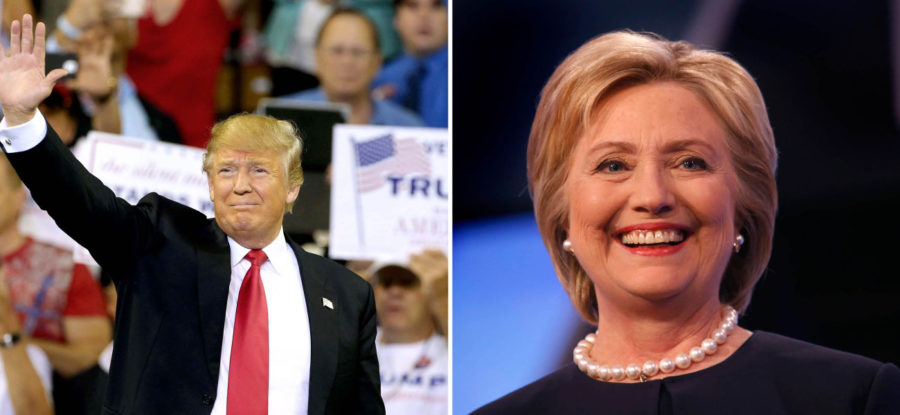Trump and Clinton ahead in Illinois, but anything can happen
March 11, 2016
Illinois should be easy to figure.
For Democrats, it’s the state of Barack Obama and where Hillary Clinton grew up. Among Republicans, it has a long tradition of independent-minded GOP governors and senators untethered to conservative orthodoxy such as Sen. Mark Kirk.
Yet as Tuesday’s presidential primaries approach, nothing is predictable.
Advertisement
Carole Piontkowsky, 56, a Belleville homemaker, sure isn’t. “I’m just floundering for air,” she lamented. “I don’t know what to do.”
Piontkowsky, who participated with other Illinois voters in a focus group organized by McClatchy and the Belleville News-Democrat, was a fan of New Jersey Gov. Chris Christie, but he’s no longer running. She had warmed to Sen. Marco Rubio, R-Fla. Not anymore, after his caustic debate performances. “He did a 180-degree turn and it turned me off,” she said. Gov. John Kasich of Ohio is “OK,” she said, but added, “I don’t think he can win.”
So many factors make 2016-vintage Illinois a challenge to handicap. Unemployment in St. Clair County, over the river from St. Louis, remains above the national average. U.S. Steel last year laid off more than 2,000 workers at its Granite City plants. Olin Crop. cut workers in East Alton. State universities are laying off employees as a state budget crisis drags on. Up north, Chicago is being torn by racial tension, and Mayor Rahm Emanuel barely survives efforts to oust him.
Into this maw have stepped two renegades, Donald Trump and Sen. Bernie Sanders. As they’ve done around the nation, they’ve become vehicles for angry voters, unconventional choices for the White House who have shaped the 2016 races.
Trump leads in Illinois Republican polls, while Clinton maintains a lead among Democrats. The Clinton lead is fragile, though. In Michigan, a state with similar demographics and economic anxiety, Sanders stunned the former secretary of state after polls had her up 20 percentage points on the eve of Tuesday’s primary.
The Trump pattern, though, so far is repeating itself in Illinois. He got a corps of surly supporters early, and they have stood with him all the way.
“His is not an ideological appeal, and it’s not a policy-based appeal. It’s people’s perception of him as a leader,” said Kent Redfield, a professor emeritus of political science at the University of Illinois at Springfield.
Advertisement*
And he’s different. “He’s not a politician. We can’t keep sending the same people back to the same offices,” said Michael Shaw, 68, a Fairview Heights retired energy company salesman. “I would like to try a businessman running the country a little bit more like the company. I just think we ought to give it a shot.”
Trump’s appeal is largely to white, blue-collar workers, the people who either lost their jobs during the 2007-09 Great Recession or had a neighbor who did. And they haven’t felt any sort of recovery since; instead they see Washington policymakers dawdling and forgetting the people of towns like Belleville.
“People like what Trump is saying about unfair foreign trade agreements, China, and so on,” said Kurt Prenzler, Madison County Treasurer and a Republican.
Trump does face challenges.
“He has a tendency to speak in codes,” as he insults Mexicans, Muslims and others, said the Rev. Dr. John Curry of Belleville, 59, a retired prison warden.
Eda Hackmann, 62, of Fairview Heights, a children’s hospital chaplain, had been for Trump until “I saw a man start behaving like a 2-year-old, saying words that I didn’t allow my kids to say and having temper tantrums.”
And there are anti-Trump ads coming. Club for Growth Action says it plans to run spots on statewide cable and satellite TV, and on broadcast markets in St. Louis, Chicago, Champaign, Peoria and Paducah, Ky.
David McIntosh, the club’s president, called Illinois “absolutely crucial in the Club’s effort to defeat Trump.” He wants voters to “see Trump’s liberal record, and see that he’s the worst type of politician who will say anything to get elected and then do the opposite later.”
There’s uncertainty where skeptics would turn, though.
Sen. Ted Cruz, R-Texas, has support among hard-core conservatives, but there are concerns about how effective he could be.
“I have not heard Sen. Cruz say how he could bring people together, how he could get all those senators on board to pass legislation he could sign,” said Piontkowsky.
No, said John Hackmann, 62, a Fairview Heights retiree and Cruz backer. Remember, he said, that President Ronald Reagan “went directly to the American people and the people went back to Congress and said ‘let’s do this.'”
David Vail, 66, a Pentagon retiree from O’Fallon, Ill., wasn’t buying it. “He appeals to too narrow a constituency,” he said.
“He hasn’t said he won’t ever compromise,” replied Hackmann. “He just said he won’t compromise on constitutional-specific issues and that message isn’t getting out.”
Kasich, and to some extent Rubio, would seem to fit snugly into the state’s center-right GOP tradition. But Rubio is devoting his efforts this week to surviving in his home state.
There’s also doubt about whether Kasich is viable. He boasted of momentum coming out of Michigan, but in fact he placed third with 24.3 percent of the vote.
Kevin Sheridan, 57, supports Kasich, but the Fairview Heights journeyman millwright sees him as having little chance. “When push comes to shove, it’s gonna come down to two Republicans,” he said — Trump and Cruz.
The Democratic equation seems simpler. Clinton has emphasized how her presidency would essentially be an Obama third term, a popular notion in his home state. Chicago’s politically active, sophisticated black population is likely to give her a big majority, and she can claim deep roots here, having grown up in suburban Chicago.
Sanders, though, brings enthusiasm and freshness. When he spoke at Southern Illinois University Edwardsville last week, he attracted 4,000 people. His message resonated with students feeling the sting of the state budget chaos. Not only has that led to layoffs throughout the state higher education system, but it’s made it tougher for students to get state scholarship money.
Tronda Minnie of Alton, 37, a building service worker at SUIE, is an unabashed Sanders fan. “He is still fighting today in 2016 for the same things he was fighting for in 1977,” she said. Clinton? “Where’s her money come from? Big businesses? And what are big businesses worried about? Big businesses.”
Sanders draws voters who can’t stand Clinton. “I don’t like him that much,” said Richard Wagner, 75, a Highland psychotherapist. “But in my opinion we have a totalitarian attitude in the administration now, so socialism, no big deal.”
That’s the sort of attitude that makes this state hard to figure just days before the primary.
“I’m sick of everybody,” said Piontkowsky. “I don’t know what I’m going to do.”
Advertisement









